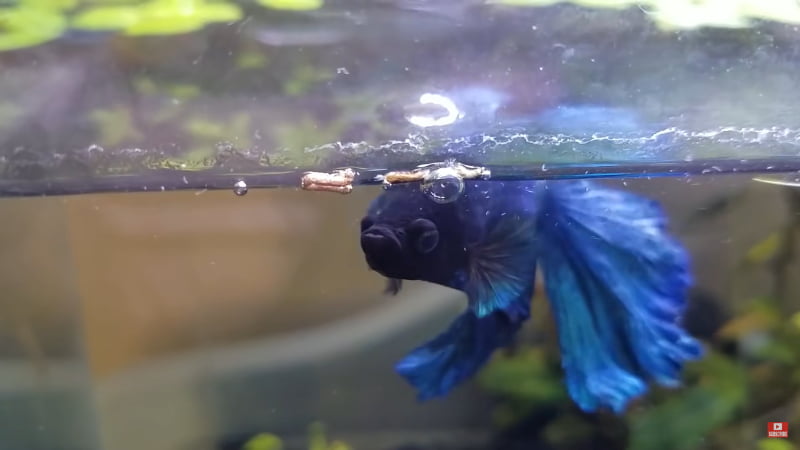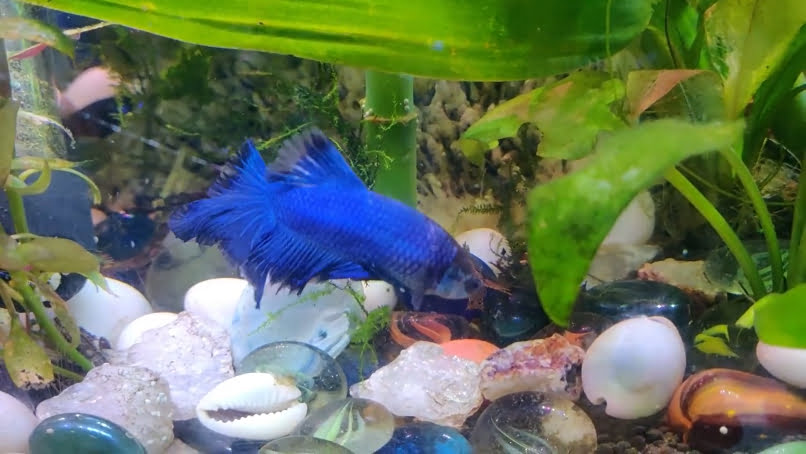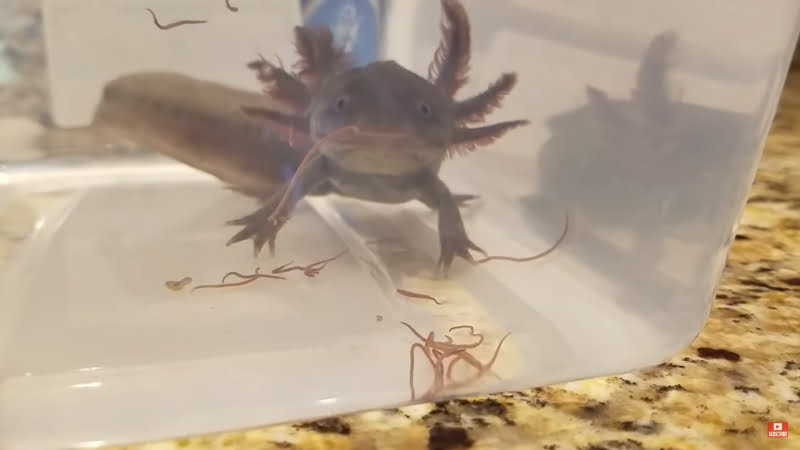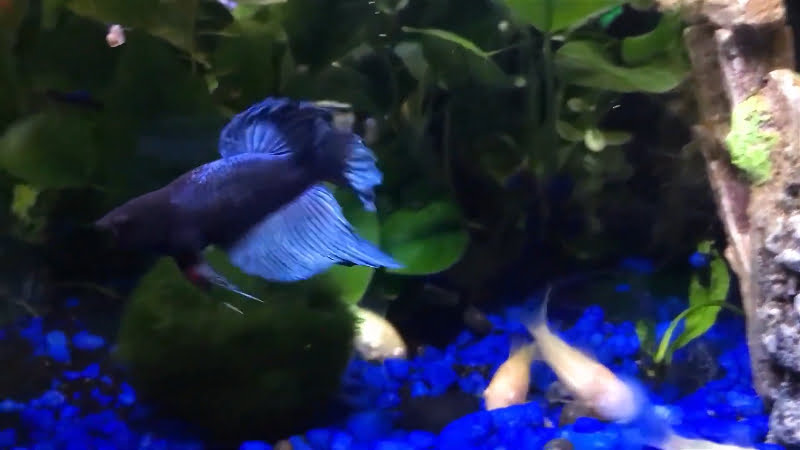Betta fish won’t eat? Such a bad situation for our little guy.
When our betta refuses to eat for more than a few days, we worry the most about him. “How to get my betta fish to eat?” I’m sure you’d be under a lot of stress and couldn’t stop asking. Naturally, an old betta fish doesn’t eat the same amount as others, and this will come with health problems before dying. So, in this article, we’ll just talk about normal betta fish that suddenly refuse to eat.
When a betta fish refuses to feed, it’s a sign that something else is wrong, and this can be distressing for the owner. It’s possible to figure out what’s wrong with your betta fish if it won’t eat, so try these methods to get your fish back to eating normally.
Find Out How Long This Situation Has Been Going On
Depending on how long your betta fish refuses to eat, you can tell how serious the situation is. As long as it’s only once every few months, it’s not a big deal. It’s because your betta is a little erratic sometimes. It’s a concern, however, if it’s regular and consistent.
The health of our little man could be in jeopardy if you don’t find out what’s causing this for a long period of time (two weeks or more). Changes in lifestyle, such as shifting dietary habits or exposure to new environments, can all play a role.
Keep an eye on things as soon as you notice any changes in your fish’s behavior since they require food.
Your Betta Fish Won’t Eat: 11 Causes
Erratic Behavior As A Result Of Your Betta’s Fussiness
If this is the case, your betta isn’t going to eat most of the time. If you’ve been giving him one type of food for a while and then changed it, he might not like it. You know, many breeders and pet stores had fed young Betta fish some pretty high-quality foods such as frozen, freeze-dried, or even live foods like daphnia and brine worms. Then, you brought a new betta to your home and gave him food that he didn’t accustom, he would be really fussy.
How to figure this out is to give him different foods to eat. It’s likely that he’s just being picky.
Solution
There are two ways to solve this problem that is considered short-term and long-term solutions.
The short-term solution also is the easiest one, you can just feed your betta food he likes and get rid of the food he doesn’t like. But, this might not be as easy as you think. In the future, your betta can’t be angry and refuse to eat until you give him the exact type of food he used to.
So, the best thing to do is to start feeding your betta plenty of food until he can eat a lot of different things. Just start by giving your betta many new foods until he isn’t fussy, or you can fast him for a few days to save money. Once he hasn’t eaten for a while, feed him the food he didn’t want. He should eat it.
Food Is Frozen/Freeze-dried

Some bettas won’t consume frozen or freeze-dried food unless it’s thawed correctly. Your betta may just disregard it if you drop it into the tank without first allowing it to thaw or soften.
In addition, some frozen foods expand when they rehydrate, so keep that in mind as well. Many bettas suffer from constipation and swim bladder illness if they eat their food too quickly.
Solution
The answer here is straightforward. Simply thaw the food you intend to feed to your pet betta. The simplest method to do this is to place the meal in a small bit of water from your tank. Your betta will devour the food as soon as it’s defrosted, so don’t worry about it.
He Doesn’t Know It’s Food
The betta fish may not be eating because he doesn’t know what you are giving him is food. This is especially true if he’s just moved into the tank and doesn’t know what to eat. When it comes to pellets and flakes, this is a common thing.
As long as bettas are with their breeders, they will only be fed a mix of live and freeze-dried food. This is the best food for a betta to eat because it’s what they would eat in the wild.
Because once you try to feed them pellets or flake food, they won’t even know it’s food. They won’t even know it’s food.
Solution
Keep introducing them to the food until they figure out that they can eat it, then let them try it. Most of the time, it will only take them 2-7 days to start eating the food they bought. A fussy betta may not eat the food after this time, so you may need to find another pet.
Keep in mind that you should never let a betta go more than three days without food. Then you’re going to do more harm than good. Keep extra food on hand, just in case.
Also, if your betta hasn’t eaten the food in 10 minutes, get rid of it from the tank and clean the water in the tank. This is what will happen if it’s left in the tank. As it starts to rot, it will make more ammonia. There are also live foods like daphnia and bloodworm that can be good for your fish, as well.
It’s Your New Betta’s First Night at Home
When you first get a new betta, it’s easy for them to refuse to eat. They may be stressed as a result of the move and being in a new environment. (This is especially true if you shipped your betta rather than purchasing him from a store.)

Solution
The simplest solution is to give your betta some time to settle. Turn off the lights for a few days and try to feed him in the morning and evening. If he refuses to eat, remove the food after 10 minutes.
You are Feeding Him Too Much
You may not even be aware that your betta is eating at times. Because a betta’s stomach is roughly the size of an eye, he won’t be able to eat everything you give him. You may think he’s not eating because the food is floating at the top of the tank. In reality, though, you’re just giving him way too much food.
Solution
Again, the answer is a no-brainer. If you’re feeding your betta too much, you’ll have an unhappy pet. Only give him 1-2 pellets of food, or the equivalent, every other day. In general, make sure he’s not going overboard on his daily caloric intake.
The Food Is Poor Quality/Not Giving Him A Balanced Diet
A lot of the pet food sold at pet supply stores is dirt inexpensive. And, as you might expect, the ingredients used to make low-cost meals are also low-cost. There are many reasons why your betta may not be eating, and one of the most common is poor quality food.
It’s possible that he’s not getting a diversified diet, even if the food is of high quality. However, it’s not enough to just feed your betta high-quality pellets; you must also provide a variety of live, frozen, and freeze-dried foods to keep his diet interesting.
Solution

Balanced diets are the best way to ensure that your betta and any other fish you care for are healthy. Your betta’s diet doesn’t have to be expensive or time-consuming. In addition, to live food, I occasionally feed my bettas freeze-dried daphnia and betta pellets. Food can be purchased once and will last for a long time.
Problem With The Water Temperature
The temperature of the aquarium can lead a betta fish to stop feeding at times. Because Bettas are cold-blooded, a large portion of their energy comes from the surrounding environment.
Your betta’s metabolism will be slowed down if you keep it in a tank that isn’t warm enough. It will take longer for your betta to digest his food if his metabolism slows down.
Even if you don’t think it’s a problem, bettas can die from temperature shock if kept in cold water for an extended period of time. Moreover, if you don’t already own a heater for your betta, here’s why you should acquire one:
Solution
Make sure your betta’s tank is kept at a temperature of 78°F or higher to avoid this issue. Make sure your tank has a heater in order to accomplish this. If you reside in a hot country, only one chilly night can substantially alter the temperature of a tiny aquarium.
A Change In Their Environment
These fish are extremely aware of their surroundings. Water chemistry changes can have an impact on fish-eating patterns, especially if they’re bad. Ammonia spikes are the most typical cause of tank change. Your betta may also refuse to eat if the tank has been contaminated by any chemical.
Though there is a chance it’s nothing horrible. Changing the water might also cause this. The pH, ammonia level, and other parameters in the water you add to your tank will be different from those your betta is accustomed to. However, as soon as your betta gets used to the new environment, he should resume eating contentedly.
Solution
To get your betta to start eating again, wait a few hours after a water change and give it another chance. However, if this is the case, you may want to examine your tank’s settings. Changing the water or resolving the problem if the parameters are out of whack is always a good idea. Then your betta should be able to eat contentedly once more.
Nitrate poisoning
A sudden rise or a long-term exposure to Nitrate levels of 20 or more PPM in the aquarium water can poison your Betta fish. Nitrate poisoning is one of the most common reasons why a Betta won’t eat, and can also cause the fish to become lethargic.
When poisoned your Betta won’t have the desire to move and will likely prefer to lie on the bottom of its tank.
Nitrate toxicity has also been related to swimming bladder disease, which causes a Betta to swim sideways or even upside-down.
Solution
First, use a water test kit, such as the API Mater Test Kit. It’s a reliable test kit that I want to recommend to you. If the test shows alarmingly high nitrate levels (20 ppm or more), you must act immediately. Lowering the nitrate content in the aquarium’s water to below 15 ppm and in the case of more sensitive species of fish – to below 10 ppm is the only solution.
Important Note For This Case
To treat your betta that has been poisoned by Nitrate, you must use a larger amount of water, up to 40%. However, just like rapidly increasing nitrate levels, drastically lowering them will put a fish in a lot of trouble. The correct way to solve this is to proceed slowly. In detail, please spread this 40% across multiple smaller water changes of 5% every 1 hour.
Ammonia Poisoning
Ammonia is caused by uneaten fish food and fish waste. Organic matter decaying in the tank also releases ammonia. It lasts in silence, so you can’t realize until the situation can’t be helped. Besides refusing to eat, other symptoms of ammonia poisoning in Betta fish would be red gills and rapid breathing.
Solution
You’ll need a standard test kit and if the ammonia level in your tank rises above 1 ppm, you should do these treatments:
- Lower the pH of water by changing 10% of the aquarium’s water each hour, until you exchange 30 to 40% of the total water volume. A water conditioner is in use if the levels of your tank are above 2.5 ppm
- To take care of the remaining ammonia, you should add some ammonia detoxifiers such as Seachem’s Prime to the fish tank.
- Stop feeding in a few days if water is in a very high level of ammonia
- You shouldn’t add any new bettas to your tank. For bettas that are affected, you may need to place them in a quarantine tank until the ammonia problem in the main tank is resolved and they can be treated with quality antibiotics or antibacterial medication.
Diseases
His appetite will usually be the first thing to go if your betta is sick or hurt. If you don’t want to eat, there will also be other signs that something is wrong. Some common diseases that can make you not want to eat are dropsy, constipation, and swim bladder disease.

Solution
If you think your betta has a disease, you need to make sure that you’re taking care of it quickly. There are a lot of diseases that can quickly kill your betta if you don’t treat it right away. To figure out what your betta is sick with, look at all these articles. They can help you figure out what it is.
Video: Betta fish won’t eat
FAQs
How long can betta fish go without eating?
It’s possible for most fish in a fish tank to stay alive while they don’t eat for a few days. Some fish do better than others. Betta fish can go without food for 10 to 14 days at a time, but there are a lot of factors that go into this.
What does an unhealthy betta fish look like?
A lack of appetite or inactivity is two of the most common symptoms of an unhealthy betta. When betta fish become ill, they may become discolored, lethargic, and standoffish. Furthermore, betta fish refusing to eat is a common sign and must-notice problem.
What to feed betta fish?
Contrary to popular belief, Betta fish do not consume plant roots and cannot thrive on a diet consisting solely of vegetarian fare. Freeze-dried foods, live foods (such as mosquito larvae and brine shrimp), and fish flakes and/or pellets that are high in crude protein make up the ideal betta diet.

Annette M. Chaney is an experienced marine biologist with over 20 years of experience as an aquarist and fishkeeper. She started her first aquarium at a young age, filling it with frogs and goldfish obtained from the ten-cent pet store.
Annette grew up caring for and breeding African Cichlids, which led to a hobby in high school that doubled as a profitable means. Attending Reed College gave her time to solidify herself as an accomplished aquarium caretaker with an eye for sales. After that, from 2009 – 2013, she studied at Roger Williams University – one of the most prestigious universities for Aquaculture and Aquarium in USA. She is the founder of AquariumCircle since 2010.
